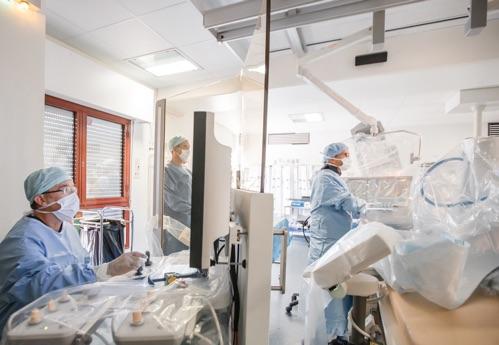
The Robocath R-One cath lab robotic platform being used in Rouen, France, to guide a cardiac Cath procedure. The system gained European approval in 2019. Robocath is now partnering with Philips France and Rennes University Hospital to develop the robotic system to treat strokes.
July 7, 2021 – Robocath, a company that designs, develops and commercializes cath lab robotic solutions to treat cardiovascular diseases, and Rennes University Hospital, announced the launch of a co-development research program using robotics to improve treatment for stroke victims.
With the support of Philips France, this program will be implemented over the next four years. It will focus on the use of robotics in treating strokes, the second most common cause of death globally after myocardial infarctions. The program will begin with a clinical study into the treatment of carotid artery disease using R-One cath lab robotic platform, which has been on the market since 2019.
This first-generation robotic solution was designed to improve the treatment of cardiovascular disease by enhancing physicians’ movements through increased precision. It also helps medical staff to drastically reduce their exposure to X-rays by allowing remote control of catheters outside of the radiation field.
Following the clinical study, the partnership will become an active R&D collaboration aimed at improving and enhancing current and future generations of robotic solutions, based on the synergy between both parties’ skills and know-how.
“I am delighted to be launching this scientific research partnership with Robocath and to be working with this passionate team," said Dr. François Eugène, an interventional neuroradiologist at Rennes University Hospital. "Robotics is already successfully used to treat coronary disease in humans. The benefits of this technology can also be applied to the treatment of certain neurovascular diseases. This is largely because precision of movement is a key factor in treating stroke patients; the use of robotics will increase the success rate of these procedures. I'm very excited to get started on the clinical study.”
Philippe Bencteux, M.D., president and founder of Robocath, explained, “This unique partnership will enable Robocath to enter the next phase of its development strategy. The research program opens up promising new avenues for both our current and future generations of robotic solutions.”
For more information: www.chu-rennes.fr, www.robocath.com
Related Interventional Lab Robot Content:
VIDEO: First Robotic PCI Case in Germany With Robocath R-One System
VIDEO: Interventional Stroke Care May be Aided by Robotic Cath Lab Telemedicine
Corindus Seeking Neurovascular Intervention Clearance for CorPath GRX Vascular Robotic System
Siemens Completes Acquisition of Cath Lab Robotics Vendor Corindus
Robocath Successfully Carries Out First Robotic Coronary Angioplasties in Humans
Robocath Receives $1.5 Million in Capital for Advancement of R-One Robotic System


 November 14, 2025
November 14, 2025 









